Prison Scandal Touches Raw Nerve of a Key US Ally
Prison Scandal Touches Raw Nerve of a Key US Ally
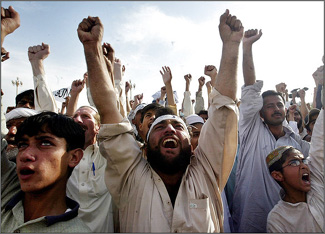
WASHINGTON: "How can a country whose soldiers have no respect for the holy Quran be the most important ally of the Islamic Republic of Pakistan?" This anguished rhetorical question posed by Maulana Fazlur Rahman, the leader of Pakistan's parliamentary opposition (and religious party member) raises an issue with profound implications for Pakistani and US strategy in the region and its broader war on terror.
Fazlur Rahman's comment was triggered by the furor over charges and the later acknowledgement by the US military that Guantanamo Bay interrogators had "mishandled" the Quran – desecrated, in the more precise language of the Muslim world. This outrage was compounded by Pakistan's raw, sectarian politics. Twice in a few days, suicide bombers left dozens dead and wounded at mosques in Islamabad and Karachi, while nearby, crowds chanted protests against the United States. Small wonder that the Pakistanis are questioning the US-Pakistan alliance.
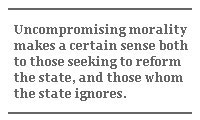
Although ordinarily peripheral to international opinion – which is focused on Pakistan''s nuclear weapons and its role in regional insecurity – local politics in Pakistan and neighboring Afghanistan are once again pivotal in global affairs. Under a darkening shadow of intolerance, American behavior across the globe, including in Pakistan itself, cuts to the heart of Pakistan's civic identity, and its complicated role at the fulcrum of Asia.
Sectarianism has long plagued Pakistan. In the country's early years, strident religious parties often clashed with secular ones over the proper relationship between religion and politics; their disputes helped postpone the adoption of a constitution for almost a decade. But old-line religious parties also played an important role for those Pakistanis whose standing and ambitions were uncertain in this rigidly class-bound state. They rallied in the cause of Islamic government, as they do today in procession after public procession, but also preached a kind of populism to dictators. Relieved secularists would point to the electoral failures of religious parties, often ignoring the fact that uncompromising morality makes a certain sense both to those seeking to reform the state, and those who the state ignores.
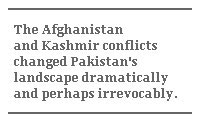
Pakistan's first experience of martial law in the early 1950s, a response to political agitation against minority Islamic sects, established a principle of military primacy in the state and inculcated the fence-sitting habits that still color its governance. But continuing ambivalence in the face of organized demonstrations by Pakistan's old-guard Islamic parties, and guerrilla attacks by newer militant groups, has become a dangerous combination. General Musharraf pleaded last week, as he usually does, for "moderation according to Islam" while nonetheless allowing backroom deals that give extremists an important voice in politics. Public policy on matters of ideology remains a private calculation by, and on behalf of, those who have seized power, whether by coup d'etat or increasingly violent blackmail.
These quarrels might have simply persisted as local variations on the relentless themes of civil-military tension and the vagaries of convenient dictatorships – but for the profound interruptions of war and international terror. The Afghanistan and Kashmir conflicts changed Pakistan's landscape dramatically and perhaps irrevocably. An alliance of Pakistan's military with old-guard religious parties – the Jamaat-islami and the Jamiat-I-Ulema-I-Pakistan – spawned new militants and armed factions: Militant Sunnis assassinated Shias in Pakistan (as they did recently in Karachi), the Taliban movement took control in Afghanistan, and private militia occupied the military space that was denied the army in Kashmir. These groups, including some funded from outside the country, have been consistently patronized by the military and when necessary, tolerated by civilian governments that could neither work easily with them nor do without them.
Marching in awkward tandem, politicized soldiers and religious parties steered established politics in new directions. Traditional arguments about social convention continued: Disputes about whether women can compete against men in sporting events turned violent just last month, and this winter, General Musharraf quickly overturned his decision to remove religious designations from passports when old sectarians objected to this hint of secularism. Most important, Pakistan must now cope with militia armed both with conventional weapons and an unwavering sense of rectitude.
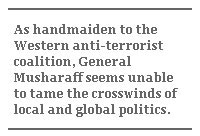
Pakistan's religious parties have never been unified. Some seek to influence politics, others to change it radically from within, still others to force a change from outside. In the last national elections, the old and the new garnered a plurality of votes in provinces bordering Afghanistan. Voters conveyed their disenchantment with Musharraf and his alliance with the United States, the central government's continuing efforts to exert control of previously autonomous tribal areas, and the absence of a clear moral compass for the state. The same parties forced General Musharraf to choose between his military and civilian jobs. He agreed, later reversed himself – earning scorn at home and abroad – and now wants to extend his tenure as president. But as handmaiden to the Western anti-terrorist coalition, General Musharraf seems unable to tame the crosswinds of local and global politics that conspire to spin him sharply off course.
Pakistan's political norms and standards are now immensely pliable. Without the fundament of open political debate and democratic institutions, those who seize power can at best knit together small nodes of self-interest that rarely translate into popular support, whether for an individual, a party, or a slate of issues. His government reinforces its distance from society and mercilessly tightens the perimeter of politics. Secular parties, suffocating from restriction and out of practice, turn to insular, dynastic squabbling that earns them the disdain of the military and little patience with voters.
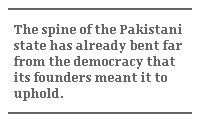
Governing Pakistan is a treacherous job. Even so, General Musharraf's patchwork political agenda appears dangerously reactive, with government lurching from crisis to crisis to protect its flanks: guarding against militants who might block future peace deals on Kashmir; neutralizing foreign and domestic militants along the Afghan border who resent the 70,000 troops sent there to chase al-Qaida and defuse tribal politics; and preaching moderation to the extremists it has long nurtured. General Musharraf therefore tries to sell the military as the only alternative to mullahs. In so doing, he sells his country short.
This is where the misdeeds of Guantanamo meet Pakistan's embattled mosques. Pakistanis, who knowingly greet alliances with the United States with experienced skepticism, grasp the difference between US hopes for Middle East democracy and its utilitarian relationships with a string of Pakistani dictators. For its part, the US supports Pakistan in the full knowledge that human rights and democracy will not emerge from this purpose-built alliance. Its sympathies have been warmed, ironically, by the mutual enmity that militants visit on the US and General Musharraf.
The spine of the Pakistani state has already bent far from the democracy that its founders meant it to uphold. The Jamaat and the Jamiat are arguing for decency and consideration from those who seek to use Pakistan as a regional linchpin, anti-terrorist incubator, and handy ally. They now seek a new litmus test for global relationships: respect for the principles on which the Pakistani state is supposed to rest. They expect General Musharraf to deliver that message, and deliver on its promise to his own citizens. If he doesn't, trouble will surely follow.
Paula R. Newberg is a Guest Scholar at the Brookings Institution.